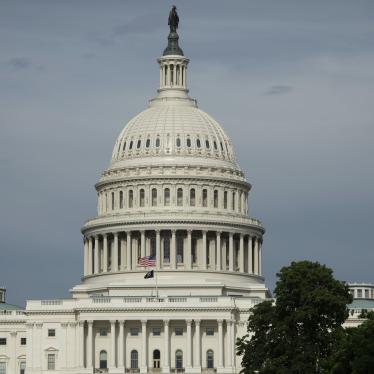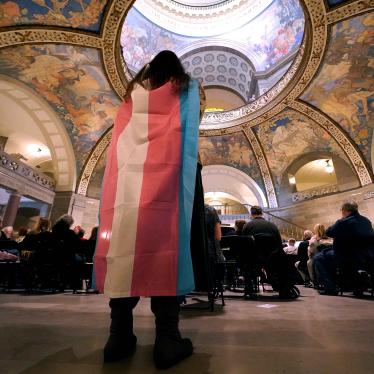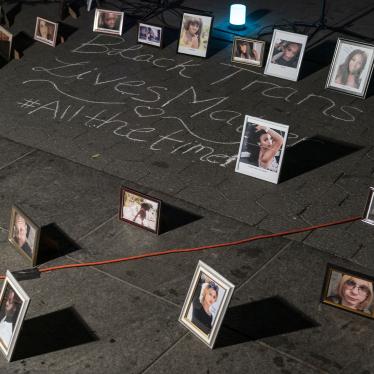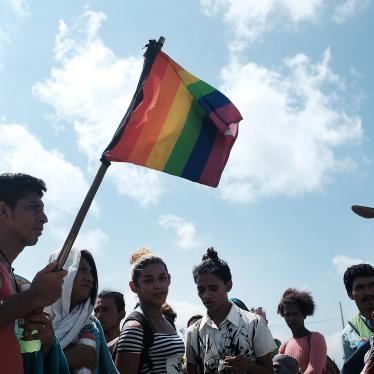September 10, 2007
Governor Arnold Schwarzenegger
State Capitol Building
Sacramento, CA
Via facsimile: 916-445-4633
Dear Governor Schwarzenegger:
On behalf of Human Rights Watch, I urge you to sign A.B. 43, “The Religious Freedom and Civil Marriage Protection Act,” which would extend civil marriage in the State of California to lesbian and gay couples. As you know, the State Assembly approved this bill on September 7, 2007, by a vote of 22-15; earlier this year, the State Assembly passed it by a vote of 42-34. You vetoed a similar bill when passed in 2005. We hope that this time, the principles of human rights will prevail. We urge you to act upon your stated, strong commitment to defend the rights of lesbian, gay, bisexual, and transgender Californians.
The decision you will make is about basic human rights as well as state and national law. You know that California and the United States can be examples to the international community; you are uniquely positioned to recognize the human rights dimensions, as well as the historic implications of this decision. The ramifications of your choice will extend beyond California. They will be heard across the world. Your signature can help make your state a global leader in progress toward full equality in human rights.
The right to marry is a basic human right. So is the right to be free from discrimination. Civil marriage is not an exception to the protections against unequal treatment. The right to marry should be enjoyed without discrimination.
California is one of many jurisdictions that have responded to the call for equality in recognition of relationships by creating a parallel regime for same-sex relationships. California’s domestic partnership provisions are strong. Such steps are progress--but fail to provide true equality.
Segregating same-sex unions into a special legal status acknowledges them as separate but only putatively equal. In fact, separate is never equal. The history of racial segregation in the United States shows how preserving discreteness only perpetuates discrimination. Even if the rights promised by civil unions on paper correspond exactly to those of civil marriage, the distinct category means that the stigma of second-class status will still cling to those relationships.
Governments committed to equality cannot legitimately reserve certain areas of civil life as exempt zones where inequality is allowed. Human rights principles demand that states end unequal treatment in recognizing families and relationships. The status of civil marriage should be opened to all without discrimination based on sexual orientation.
Many governments have grasped the urgency of ending discrimination in access to civil marriage. The legislature of my own country, the Netherlands, extended full civil marriage to same-sex couples in 2001; Belgium did likewise in 2003. The parliaments of Spain and Canada followed suit in 2005. In all these places—as well as in many other subsidiary jurisdictions that have granted recognition to same-sex couples within their powers—the decision was made by legislatures freely elected by the whole people. The same is true of the freely elected legislature in California.
In the past, you have invoked the “will of the people” to justify vetoing the legislature’s acts on marriage equality, citing a 2000 referendum’s results. (The expressed intent of that referendum was to ban not same-sex marriages performed in California, but California’s recognition of such marriages performed elsewhere.) However, when the elected legislature has spoken, your decision should be based not on evasive technicalities, but on upholding human rights. Democracy lies in principle as well as process. Equality is an essential principle. Your decision to sign or to veto will reveal whether you see equality as rhetoric or as commitment. We urge you to take the side of human rights.
Emerging from the historical catastrophe of apartheid with a determination to ensure equality for all, South Africa created a new constitution, in 1996, with sweeping protections against all forms of discrimination. It was the first constitution in the world expressly to bar unequal treatment based on sexual orientation. California may be on another continent, but South Africa still provides a clear example. In its landmark decision in 2005 supporting marriage equality, the South African Constitutional Court declared:
What is at stake… is how to respond to legal arrangements of great social significance under which same-sex couples are made to feel like outsiders who do not fully belong in the universe of equals. …A democratic, universalistic, caring and aspirationally egalitarian society embraces everyone and accepts people for who they are. To penalise people for being who and what they are is profoundly disrespectful of the human personality and violatory of equality. … Accordingly, what is at stake is not simply a question of removing an injustice experienced by a particular section of the community. At issue is a need to affirm the very character of our society as one based on tolerance and mutual respect. (Minister of Home Affairs and Others v Fourie and Bonthuys and Others, Constitutional Court of South Africa, CCT 10/05, at 61 and 60.)
The success of marriage equality in Massachusetts is another indicator of how mutual respect must be practiced in all areas of life. The character of the state you govern is at issue here. We hope that you, like the legislature, will aspire to make California a state that upholds and practices the highest standards of human rights.
Sincerely,
/s/
Boris Dittrich
Advocacy Director
Lesbian, Gay, Bisexual and Transgender Rights Program
Human Rights Watch
C.C.
Don Perata – President pro tem, California State Senate
Fabian Nuñez – Speaker, California State Assembly
Mark Leno – Assembly Member, California State Assembly
John Laird – Assembly Member, California State Assembly
Sally Lieber – Assembly Member, California State Assembly
Gloria Romero – Majority Leader, California State Senate
Dick Ackerman – Minority Leader, California State Senate
Christine Kehoe – Senator, California State Senate
Carole Migden – Senator, California State Senate
Sheila Kuehl – Senator, California State Senate







